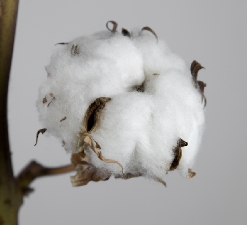 INTRODUCTION INTRODUCTION
FIBRE CATEGORY: CELLULOSE FIBRE
Cotton is a naturally occurring soft cellulose fibre which grows around the seeds of the cotton plant. It is a native of tropical and sub tropical regions, and the plant flowers throughout the year. The ‘fruit’ capsules, or bolls contain seeds, and are covered in white hairs, which are the cotton fibres. Cotton is harvested either by hand or machine picking the bolls, or mechanically stripping the entire boll.
Although cotton is native to many regions around the world, the vast majority of the cotton grown today is from one of two principal varieties of the American species Gossypium hirsutum and Gossypium barbadense. The staple length (length of the individual fibre), colour, cleanliness and micronaire (the fineness of the fibre) are what determine the quality of the cotton.
Luxury cotton varieties
Luxury cotton is defined as cotton with characteristics superior to those of the standard varieties and finishes. A longer staple fibre tends to be more desirable, as it can withstand the additional combing processes that in turn will make it smoother, silkier and finer to the touch.
There are several prefixes that imply a luxurious cotton product:
 Egyptian Cotton is used for premium clothing, bed and bath linen. Egyptian Cotton is used for premium clothing, bed and bath linen.
The term is applied to all cotton grown in Egypt, however only about 25% of cotton grown in Egypt has the desirable extra long staple length, the rest is regular cotton that is grown in Egypt. The term should be only be applied to the species Gossypium hirsutum and Gossypium barbadensse.
Sea Island cotton is mostly used for fine gauge knitwear and the term is applied only to the extra long staple cotton species Gossypium barbadensse, also known as Pima and Creole cotton. This plant has a natural antifungal property that contains the chemical gossypol, making it naturally insect repellent and therefore an ideal candidate for organic cultivation.
Pima cotton is silky smooth and is the popular name for Gossypium barbadensse, which is the same species marketed under the Sea Island prefix and also one of the two species of the extra long staple Egyptian cotton. In the United States Pima cotton is grown in the Southwestern states of Texas, New Mexico, Arizona and parts of Southern California. Many plantations are run or owned by Native American Pima Indians. Supima ® (superior pima) cotton is a registered trademark of the Supima Association of America and is exclusively 100% American Grown Pima Cotton. Pima cotton is also grown in Peru together with a similar variety called Tanguis cotton, both are grown organically, and the same species are naturally pigmented. of Southern California. Many plantations are run or owned by Native American Pima Indians. Supima ® (superior pima) cotton is a registered trademark of the Supima Association of America and is exclusively 100% American Grown Pima Cotton. Pima cotton is also grown in Peru together with a similar variety called Tanguis cotton, both are grown organically, and the same species are naturally pigmented.
|





